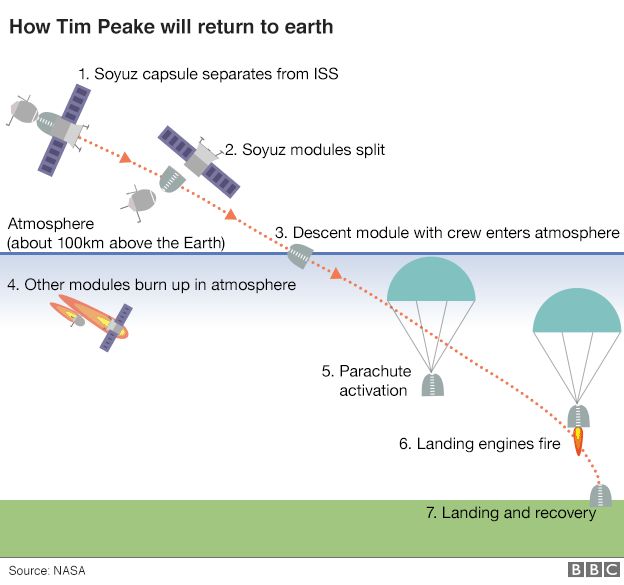World
UK astronaut Tim Peake boards capsule for return to Earth
British astronaut Tim Peake has boarded the spacecraft that will return him to Earth following an historic six-month mission to the space station.
BBC
British astronaut Tim Peake has boarded the spacecraft that will return him to Earth following an historic six-month mission to the space station.
A Soyuz capsule carrying Major Peake and two other crew members will land in Kazakhstan at 10:15 BST on Saturday.
During his stay, he made the first spacewalk by a UK astronaut and remotely steered a robot on Earth.
He is the first person to visit space under the UK banner since Helen Sharman in 1991.
Major Peake, Russian cosmonaut Yuri Malenchenko and US astronaut Timothy Kopra made their farewells and entered the Soyuz TMA-19M - the Russian space capsule that will carry them home from the International Space Station - at about 03:35 BST on Saturday.
On Friday, Colonel Tim Kopra handed over command of the ISS to his Nasa colleague Jeff Williams.
Speaking in his last live link-up from space, Major Peake said: "It's been a fantastic six months up here - [a] really remarkable, incredible experience.
"I'm looking forward to coming home, looking forward to seeing my friends and my family, but I am going to miss this place [the ISS]."
Squeezed into custom-moulded seats in a tiny return ship that hasn't changed substantially in design since the Soviet era, the three crew members will wait for more than three hours before they are clear to undock from the outpost that has been their home for 186 days.
The Soyuz performs several engine burns to nudge itself clear of the space station and, after it has drifted about 12km from the orbiting platform, the engines fire again to begin the fiery descent to Earth.

This is the most unsettling stage of the journey: as the craft plunges toward Earth at 25 times the speed of sound, atmospheric molecules dissociate and their atoms ionise, enveloping the vehicle in superheated plasma which raises the temperature outside to around 2,500 degrees C.
Once the capsule has decelerated past the plasma phase and has reached an altitude of 10.7km above the Earth's surface, parachutes open to further slow its descent. As the Soyuz floats to the ground, an engine fires to cushion its landing on the Kazakh steppe, scheduled for 10:15 BST.
A rescue team flown in by chopper will then help the astronauts out of the capsule before carrying them into a tent for medical checks.
Extended stays in zero gravity have a number of effects on the body, including muscle wastage and a loss of bone density.
The lack of gravity also redistributes fluid more evenly throughout the body, causing astronauts' face and neck to swell that gives them a characteristic puffy appearance during their first few weeks on orbit.
Britain's first astronaut, Helen Sharman, who stayed for a week on the Soviet Mir space station in May 1991, told the BBC: "To start with (after landing) you actually feel faint, more than anything because gravity's pulling blood away from your head. That faintness is the biggest reason why he'll be carried.
"I was quite wobbly for a while even though my body hadn't adapted to the pressure difference sufficiently in space. So it took me a few paces to learn to walk in a straight line again."
In 2009, Mr Peake was chosen from a pool of 8,000 applicants to join the European Space Agency (Esa) astronaut training programme, along with five other recruits.
The former Army helicopter pilot is the first Briton to be selected as an Esa astronaut.
On 15 January this year, just a month after arriving at the station, Major Peake participated in the first spacewalk for a UK astronaut. He and Tim Kopra set out to change a faulty component on the outside of the ISS, along with other tasks.
They completed the primary goal, but the walk had to be called off early when water began to leak into Col Kopra's helmet - a matter that is still under investigation.
In April, he secured himself to a treadmill on the ISS to run the distance of the London Marathon, completing the event in three hours, 35 minutes.
Major Peake participated in a number of experiments in medical science, radiation physics and materials.




 23.68°C Kathmandu
23.68°C Kathmandu













